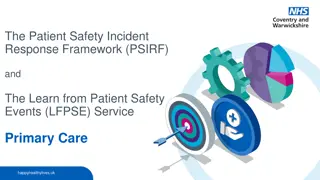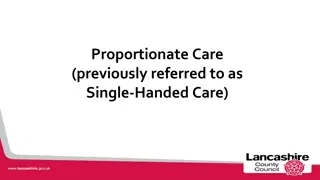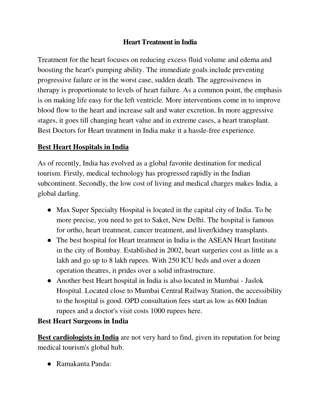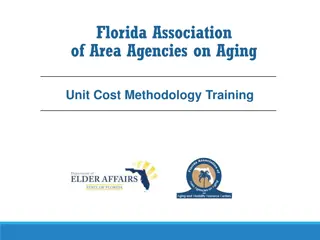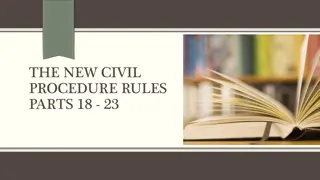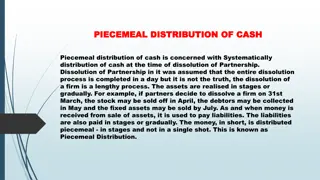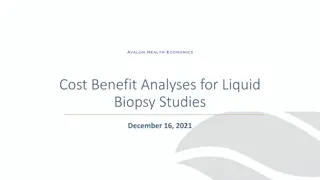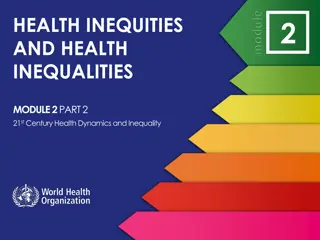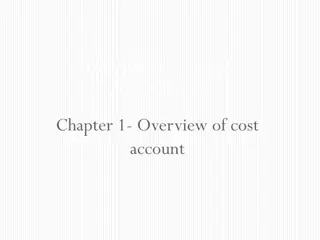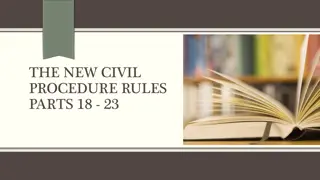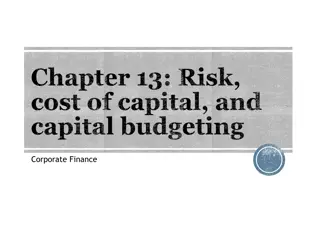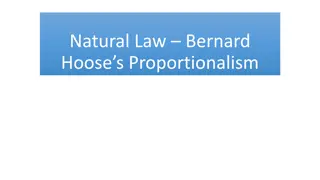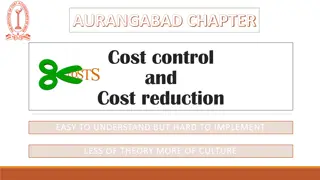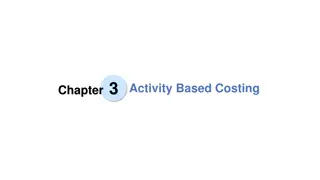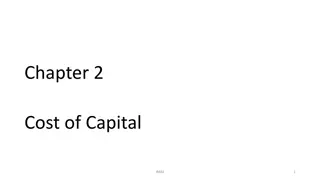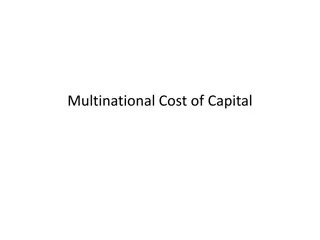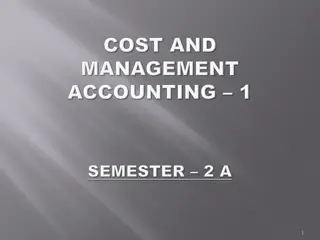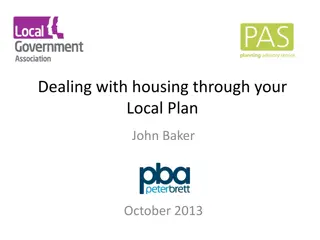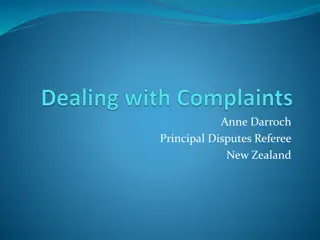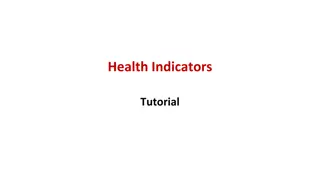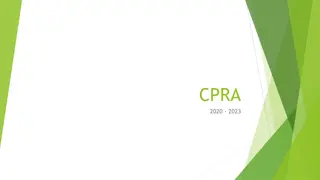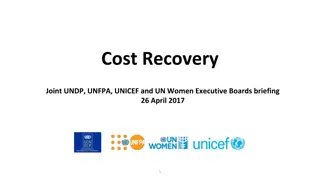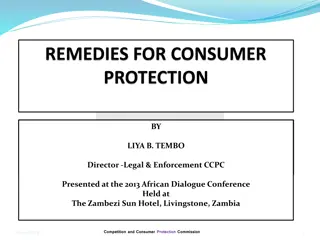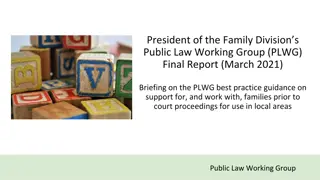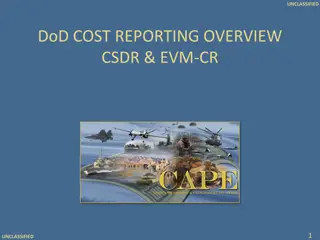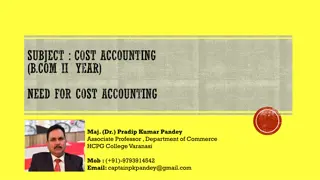Cost Of Production
Explore the concepts of production cost analysis, focusing on total fixed costs, total variable costs, total cost of production, average cost, and average fixed cost. Learn how these costs behave in the short run and their impact on a firm's operations.
0 views • 26 slides
Understanding the Patient Safety Incident Response Framework (PSIRF)
The Patient Safety Incident Response Framework (PSIRF) is set to replace the Serious Incident Framework (2015) within the NHS, marking a significant shift in responding to patient safety incidents. Its key aims include compassionate engagement, system-based learning, proportionate responses, and sup
5 views • 9 slides
Enhancing Patient Safety in Primary Care: PSIRF and LFPSE Overview
The Patient Safety Incident Response Framework (PSIRF) and Learn from Patient Safety Events (LFPSE) aim to improve patient safety by providing a structured approach to incident response and analysis in primary care settings. PSIRF emphasizes compassionate engagement, learning from incidents, proport
3 views • 14 slides
Understanding Proportionate Care in Healthcare
Explore the concept of Proportionate Care, previously known as Single-Handed Care, which aims to increase capacity in the care market, reduce delayed transfers of care, and improve service user outcomes. Addressing common concerns and myths related to moving and handling tasks, this approach promote
0 views • 10 slides
Heart Treatment in India
Treatment for the heart focuses on reducing excess fluid volume and edema and boosting the heart's pumping ability. The immediate goals include preventing progressive failure or in the worst case, sudden death. The aggressiveness in therapy is proportionate to levels of heart failure. As a common po
0 views • 2 slides
Understanding Unit Cost Methodology Training for Area Agencies on Aging
This training provides an overview of cost allocation principles and the Unit Cost Methodology (UCM) through video sessions and practical applications using UCM spreadsheets. It covers federal regulations, the operation of UCM, and the importance of cost allocation in federally funded programs. The
2 views • 33 slides
Understanding Civil Procedure Rules Parts 18-23
The new civil procedure rules cover various aspects such as counterclaims, additional claims, changes to parties, representative parties, miscellaneous rules, and rules regarding minors and patients. The overriding objective is to ensure cases are dealt with justly and at a proportionate cost, consi
1 views • 49 slides
Comprehensive Cost Management Training Objectives
This detailed training agenda outlines a comprehensive program focusing on cost management, including an overview of cost management importance, cost object definition, cost assignment, analysis, and reporting. It covers topics such as understanding cost models, cost allocations, various types of an
2 views • 41 slides
Understanding Piecemeal Distribution of Cash in Partnership Dissolution
Piecemeal distribution of cash in partnership dissolution involves systematically distributing cash over stages as assets are realized and liabilities settled. Realization expenses, contingent liabilities, outside liabilities, partners' loans, and partners' capitals are settled in a specific order.
0 views • 6 slides
Cost-Benefit Analyses for Liquid Biopsy Studies: Understanding Health Economics and Decision Making
Health economics and decision making play a crucial role in evaluating the clinical utility and cost-effectiveness of liquid biopsies. Economic models such as cost-effectiveness analyses help in determining the incremental cost-effectiveness ratio (ICER) of interventions. Studies have shown varying
0 views • 23 slides
Understanding Health Inequities and Inequalities in the 21st Century
Explore the differences between health inequality and inequity, and how societal disparities impact health outcomes. Delve into the concept of health equity defined by the World Health Organization and the role of social determinants in creating avoidable health inequities. Learn about the social gr
0 views • 23 slides
Academic Senate Resolutions and Low-Cost Thresholds in Higher Education
The Academic Senate addresses the adoption of open educational resources (OER) and low-cost materials to support academic freedom and compliance with legislative requirements. The resolution discusses the definition of low-cost resources and the variability among California Community Colleges in set
2 views • 9 slides
Understanding Cost Accounting Essentials
This overview delves into topics such as financial accounting, classification of accounts, cost ascertainment, and management accounting. It covers the meaning of cost, methods and techniques of costing, advantages and limitations of cost accounting systems, and essentials for a robust cost accounti
4 views • 27 slides
Understanding the New Civil Procedure Rules Parts 18-23
The new civil procedure rules cover various aspects like counterclaims, addition of parties, changes to case statements, representative parties, miscellaneous rules about parties, and rules regarding minors and patients. The overriding objective is to ensure cases are dealt with justly and at a prop
3 views • 49 slides
Understanding Risk, Cost of Capital, and Capital Budgeting in Corporate Finance
Explore the concepts of risk, cost of capital, and capital budgeting in corporate finance, including the Capital Asset Pricing Model (CAPM), cost of equity, beta estimation, and cost of capital. Learn how to reduce the cost of capital and understand the impact of reducing the Weighted Average Cost o
0 views • 20 slides
Valuation and Accounting for Unsold Stock in Consignment Transactions
Valuation and accounting for unsold stock in consignment transactions is crucial for determining true profit or loss. The cost of consigned goods plus proportionate expenses must be considered. Recurring and non-recurring expenses play a significant role in valuing closing stock. The value of unsold
1 views • 10 slides
Understanding Bernard Hoose's Proportionalism in Natural Law Theory
Bernard Hoose's Proportionalism presents a modern take on Natural Law theory, offering a hybrid approach that considers teleological perspectives. Proportionalism acknowledges certain acts as inherently wrong but allows for exceptions based on proportionate reasons. This flexible framework operates
5 views • 18 slides
Cost Control and Cost Reduction Strategies in Business: Understanding Implementation Challenges
Understanding the concepts of cost control and cost reduction is crucial for businesses, but implementing them can be challenging. This chapter explores the influencing factors for success in cost control and reduction, emphasizing the importance of cultural aspects, leadership, and management appro
1 views • 15 slides
Understanding Activity-Based Costing (ABC) in Cost Management
Activity-Based Costing (ABC) is a strategic costing method that allocates overhead costs to products based on activities. It offers benefits such as accurate cost allocation and identifying cost drivers but also has challenges due to increased complexity and customization. ABC differs from tradition
1 views • 15 slides
Understanding the Cost of Capital in Finance
The cost of capital is crucial for businesses to determine the average cost of their finance. The Weighted Average Cost of Capital (WACC) is used as a discount rate in financial calculations. It involves estimating the cost of each source of finance and calculating a weighted average. Additionally,
0 views • 14 slides
Understanding Multinational Cost of Capital
Multinational corporations determine their cost of capital based on the cost of debt and equity. The cost of debt includes the interest rate and credit risk premium, while the cost of equity reflects the risk premium investors demand. Estimating an MNC's cost of capital involves assessing these comp
0 views • 24 slides
Understanding Cost Accounting: Techniques and Processes
Cost accounting is a specialized branch of accounting that involves the accumulation, assignment, and control of costs. It encompasses techniques like ascertainment of costs, estimation of costs, and cost control to aid in decision-making. Cost accounting plays a crucial role in budgeting, standard
2 views • 11 slides
Understanding Criminal Behaviour Orders: An Overview and Legal Requirements
Criminal Behaviour Orders (CBOs) are issued following conviction for criminal offences to tackle serious and persistent anti-social behavior. This talk provides an overview of CBOs, legal requirements, when they are appropriate, and practical tips for implementation. The orders can prohibit or requi
0 views • 12 slides
Enhanced Family Court Police Disclosure Protocol for 2024
The 2024 Family Court Police Disclosure Protocol addresses key issues identified in the 2013 protocol, emphasizing timely and proportionate requests for material. Changes include a new checklist for the judiciary, guidance notes, and revised processes for litigants in person. The protocol provides c
1 views • 19 slides
Strategic Housing Provision Through Local Planning
Effective local planning is crucial for addressing housing needs and guiding development in the right direction. Having a sound local plan not only ensures quality development but also attracts investment. Housing provision is a significant strategic issue, with the responsibility falling on local p
0 views • 37 slides
Introduction to Industrial Costing: Understanding Cost Types and Accounting Systems
Explore the fundamentals of industrial costing, including different cost types and accounting systems such as actual cost accounting, normal cost accounting, and standard cost accounting. Learn about cost data control, tasks of cost accounting, and the integration of cost type accounting in cost and
1 views • 24 slides
Judicial Processes and Misconduct in New Zealand Disputes Tribunal
The New Zealand Disputes Tribunal, led by Principal Referee Anne Darroch, handles civil claims up to $15,000 or $20,000 by consent, with over 60 referees managing 16,000-20,000 claims yearly. Limited appeal rights are in place, with a complaints mechanism under process for all New Zealand Tribunals
0 views • 22 slides
Reflections on Punishment and Justice: A Philosophical Inquiry
Delving into the intersection of punishment, morality, and justice, this thought-provoking exploration questions the concept of proportionate punishment for crimes committed. It challenges conventional notions of retributive justice and poses ethical dilemmas related to the effectiveness of the crim
0 views • 8 slides
Effective Questioning Techniques in Teaching
Techniques involved in effective questioning in teaching include asking questions to the whole class, proportionate distribution of questions, providing wait time for students to answer, sequencing questions from simple to complex, and avoiding excessive questioning. It is important for teachers to
1 views • 11 slides
September Guidance for Schools Overview: Latest Updates on School Reopening
Schools are expected to open for all pupils with measures in place to reduce the risk of COVID-19 transmission. Emphasis is on following guidance, maintaining hygiene, implementing preventive measures, and being prepared to respond to confirmed cases. The focus is on sensible, proportionate controls
0 views • 32 slides
Managing Summer Cost Share for Faculty with 9-Month Appointments
Explore the process of setting up and monitoring summer cost share for faculty with 9-month appointments. Learn why cost share for summer may not display on the FEC, how GCA establishes cost share using the Cost Share Module, and how departments should adjust the FEC to reflect summer cost share acc
0 views • 15 slides
Understanding Health Indicators: Calculating Mortality Rates in Communities
Learn how to calculate various mortality rates—such as crude mortality rate, proportionate mortality, case fatality rate, and cause-specific mortality rate—using real-life scenarios from communities like Adias and Wales. Understand the significance of these rates in assessing public health outco
0 views • 16 slides
Consumer Privacy Rights and Regulations Act (CPRA) Overview
The Consumer Privacy Rights and Regulations Act (CPRA) addresses the asymmetry of information between consumers and businesses, aiming to empower consumers to control their personal data and ensure transparency and accountability in data use practices. It emphasizes the need for stronger laws to pro
0 views • 14 slides
Joint UNDP, UNFPA, UNICEF, UN Women Executive Boards Cost Recovery Briefing
Briefing on cost recovery for the joint Executive Boards of UNDP, UNFPA, UNICEF, and UN Women, covering topics such as feedback on cost recovery, role of core resources, cost recovery models using a LEGO approach, harmonization efforts, guidance for Executive Boards, and next steps towards proposing
0 views • 42 slides
Competition and Consumer Protection Commission: Remedies, Fines, and Guidelines
The Competition and Consumer Protection Commission discusses basic principles, remedies under the CCPA, and guidelines on setting fines for violations. Remedies must be fair and proportionate, including both financial and non-financial options. The CCPA provides various remedies and penalties for co
0 views • 9 slides
Fair Cake-Cutting Methods for Envy-Free Allocations
Various fair cake-cutting methods for allocating divisible goods among multiple agents are explored in this content. These methods ensure that each agent receives a share proportionate to their preferences, without feeling envious of others' allocations. Techniques such as connected pieces, bounded-
0 views • 28 slides
Best Practice Guidance for Working with Families in Public Law
The President of the Family Divisions Public Law Working Group (PLWG) released a final report in March 2021, focusing on support for families prior to court proceedings. The report emphasizes the importance of collaborating with families, prioritizing the welfare of the child, and making timely and
0 views • 11 slides
Local Politics in London Borough of Barnet
The London Borough of Barnet has three parliamentary constituencies represented by Conservative MPs. Local councillors, elected by the community, play a crucial role in decision-making at the council level. With 63 councillors split among 21 wards, political parties maintain a balance in representin
0 views • 9 slides
Defense Cost Reporting and Systems Overview
Defense Cost Analysis and Reporting Systems (CSDR) provide the cost community with essential data for developing independent cost estimates within major defense acquisition programs. The Defense Automated Cost Information Management System (DACIMS) offers instant access to historical cost informatio
0 views • 19 slides
Importance of Cost Accounting in Business Management
Cost accounting plays a crucial role in modern business environments where cost effectiveness and quality consciousness are vital for success. This branch of accounting helps in planning, controlling, and determining the costs of products or services, providing essential data for efficient managemen
0 views • 6 slides


